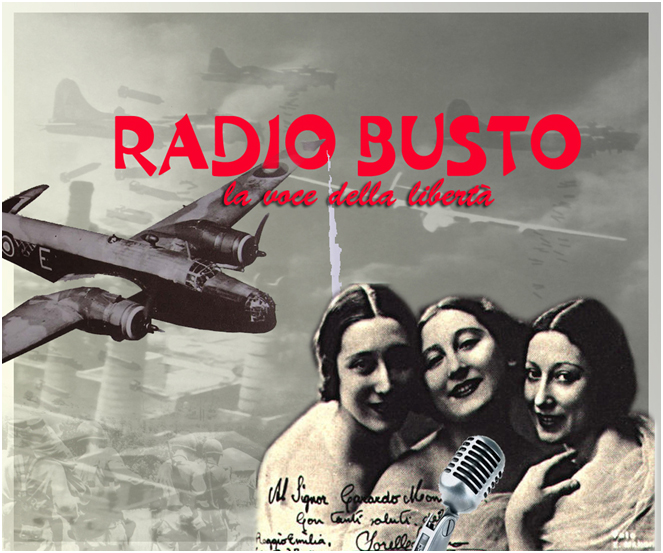RADIO BUSTO

RADIO BUSTO
Feature film
an important and unknown real story. Screenplay by Elena de Varda and Rocco Moliterno
Production: Filmlux
SINOPSIS At the end of the war, German troops were camped in Busto Arsizio, a small town in northern Italy. General Wolff, Military Governor and Supreme Commander of the SS and Police chief in Italy, gave orders to dismantle Busto Radio Station which was under German control, and bring all the technical equipment back to Germany along with German troops he thought had to withdraw soon back to Germany. On 10 May 1944, the day before Montecassino’s Battle, General Wolff, secretly, and against Hitler’s will, started negotiating with the Allies and all the forces operating in Italy in order to organize an unharmed return of the German troops (Operation Sunrise). First, he met secretly the Pope in the Vatican and then, in October 1944, he began contacts with the partisan’s commanders to allow a bloodshed-less withdrawal of his troops; between March and April of 1945, he also met Allen Dulles, head of the U.S. Secret Service and the two generals representing the allied forces, Terence Airey and Lyman Lemnitzer.
The Radio Station in Busto, managed by Germans, broadcasting songs and news to all the German troops in Italy, was a small Radio in the countryside, strategically very important. The German officers in charge of the Radio control were quite relaxed in the province habits and had good relations with the local population. Far away from the bloody front, they were almost waiting for the end of the war to return home. Engineer Giovanni Lombardo, still living, was appointed by the Germans to technical Radio assistance and came expressly from Torino, but upon his arrival he was captured by the partisans who forced him to collaborate with them, sabotaging the radio, by transmitting the latest news in the Italian language.
Those micro stories, intertwining the lives of German occupants, fascists and common people, are revealing to us an important piece of the greatest history: Germany, a tired and defeated nation, willing just to end the war and to return back home to its last alive soldiers, and Italy, a country where a civil hidden revolution was slowly rising up to take back its territory, whose symbol was in fact a Radio Station, the only way to communicate with the entire world in those times. No heroes, just common people facing situations from a different point of view, enemies by chance.
Radio Busto, despite its position in a remote province of Lombardy, has had the merit of being the first radio to reveal to the entire world the liberation of Italy and the end of the war, on April 25, 1945.
The film narrates in appealing way events that really happened, through the eyes of the protagonist, Giovanni Lombardo, an engineer at the E.I.A.R. (the Italian Authority for radio programs during fascism). Giovanni Lombardo, normal, handsome and cute man, not a hero in real life, being in charge of the technical support to the German Radio Station, was forced by chance to be a hero by the partisan movement who bound him to deal with the radio’s sabotage where he was working in. The first objective of the partisan movement was to occupy the Radio Station and installing there a short wave transmission system, which characteristic was to be heard over long distances. These transmissions were received in Africa, in America and in the rest of Italy, but surprisingly not in the neighbouring areas around Busto Arsizio.
10 pm on 25 April 1945. Busto Arsizio Radio Station, connected to the national diffusion net under the control of the O.S.S. (Office of Strategic Service) and the High Italian Committee of National Liberation, was the first station to proclaim to Italy and to the world the beginning of the uprising revolution.
Here’s an excerpt of the interview with Eng. Giovanni Lombardo:
“… It was about 10 pm. The people were invited to keep silent and we began to send our local Hymn of the Piave, then faded to Vanna Tongiorgi’s voice. She spoke into the microphone: “Attention, attention, here is Radio Busto Arsizio, we are going to broadcast an important statement.” The announcement was repeated three times. Then professor Nino Miglierina red with solemn intonation the historic statement: “We proclaim the end of the Fascist Republican Regime and we invite the population to calm and comply to the previous civil and military laws of 8 September 1943, again current. You, Italian citizens, who have suffered for your homeland trampled by the barbaric enemy, the hour of your freedom has come. You, workers in the factories, check out any attempt to the destruction of your machinery, your workshops and power plants. Save your wealth for tomorrow. You, owner of factories, Industrialists, arrange work to be continued and the canteens not to be shut down. Women, be worthy of the incoming hours. Italian all, at your place for the battle!”
Not a big radio station belonging to the EIAR authority, not even Radio London, but a small radio in the province of northern Italy was the first to announce the Italian liberation from the dictatorship of fascism, maybe the first free radio in Italy.
Giovanni Lombardo had to cope with stubborn Fascists, with German soldiers tired of the war and interceded for their life when some partisans wanted to shot the German soldiers working there; he negotiated his courage with a secret OSS agent who ordered him in a threatening way to make this sabotage; he found love for a woman who still waited for the hopeless return of her husband from the Russian front.
La story develops on a war background, between partisan ambushes, parachute launches and sabotages of strategic infrastructures. All dominated by the Radio’s voice, along with the silky voice of Marlene Dietrich and other German songs, and then silence. Another female and strong Italian voice is annunciating freedom. Her voice reaches New York, Marrakesh, Los Angeles and also Rome…
Through voices, songs and personal stories, radio Busto was to become a symbol of freedom and change of destinies.
